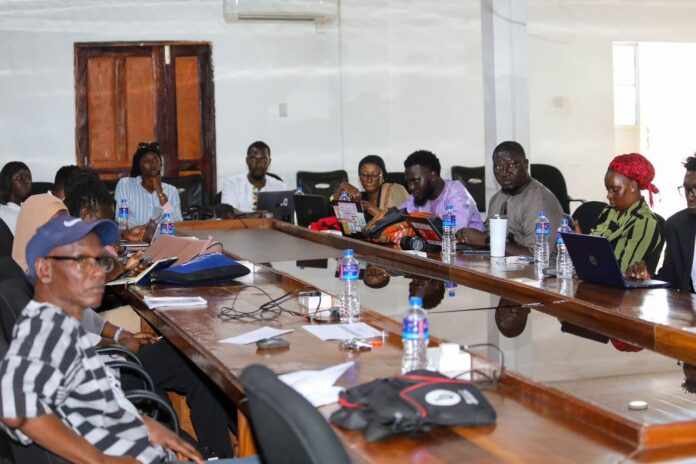By: Alieu Jallow
As part of ongoing efforts to strengthen The Gambia’s climate resilience and push for greater climate justice, ActionAid The Gambia has launched a daylong training workshop targeting national civil society organisations (CSOs). The workshop marks the first step in preparations for an upcoming national dialogue focused on climate financing and mitigation.
Held in Kanifing, the session brought together representatives from various CSOs across the country, aiming to build their capacity to meaningfully contribute to discussions on climate finance and advocate for equitable climate action. Participants explored key concepts around climate budgeting, financing mechanisms, and international accountability.
Fafa O. Cham, the Head of Programmes and Policy for ActionAid The Gambia, highlighted that The Gambia contributes less than 0.01% of global emissions but bears a disproportionate share of the impact from climate change.
“Our government is spending millions of dollars trying to build the resilience of vulnerable farmers and mitigate climate change, even though we contribute very minimally in terms of emissions. The whole of Africa is responsible for about 4%, yet we bear the brunt of the impact. African countries are taking loans to finance these efforts. It is high time we hold those responsible for climate change accountable for their actions. So how can that happen? It is through you, me, and everyone else coming together and raising our voices. We hope it will bring change,” he stated.
Cham explained that the national dialogue, expected to take place later this year, will convene a wide range of stakeholders including government officials, foreign embassies, development partners, and international NGOs.
“Our aim is to host a national dialogue with ministers, permanent secretaries, ambassadors, heads of embassies, and various agencies in attendance,” he outlined.
Despite contributing very little to global carbon emissions, The Gambia remains highly vulnerable to the devastating effects of climate change. From rising sea levels to erratic rainfall and land degradation, the country faces growing environmental threats that demand increased international support.
Aja Fatou Bah, Programme Assistant at WANEP The Gambia and a participant at the workshop, noted the importance and timeliness of the training.
“Yes, the training is actually timely,” she said, emphasizing that climate change is everyone’s responsibility regardless of age, sector, or gender—even though the country emits less.
“We still have a long way to go, and each of us has a key role to play in ensuring the impacts aren’t too severe. Even though our emissions are relatively low, we end up bearing the brunt of the consequences. If you look closely, the countries responsible for the highest emissions often don’t experience the full impact. Instead, it’s the more vulnerable communities—like ours—that feel it the most. That’s why it’s so important for us to find ways to mitigate these effects, especially for those in our communities who are most at risk,” she stated.
Lamin Dibba, Executive Director of the Centre for Democratic Economic Transparency—a civil society organisation that conducts microeconomic research and promotes transparency—spoke on the government’s efforts in climate mitigation, adaptation, and addressing loss and damage. However, he pointed out existing gaps in public knowledge about how much is actually being spent.
“So probably even at the government level, I don’t think the systems—like the IFMIS system—sufficiently capture the funding allocated toward climate change mitigation and adaptation. That’s one gap. The other is a general issue—not just limited to climate change—but across almost every sector of the economy, which is a funding deficit,” he noted.
ActionAid The Gambia is positioning this dialogue as a platform not only to engage national actors but also to call on wealthy, high-emission countries to honor their commitments to climate finance. The event aims to amplify the demand for climate reparations and support the global push to hold major polluters accountable for the damage caused to low-emission, frontline nations like The Gambia.




